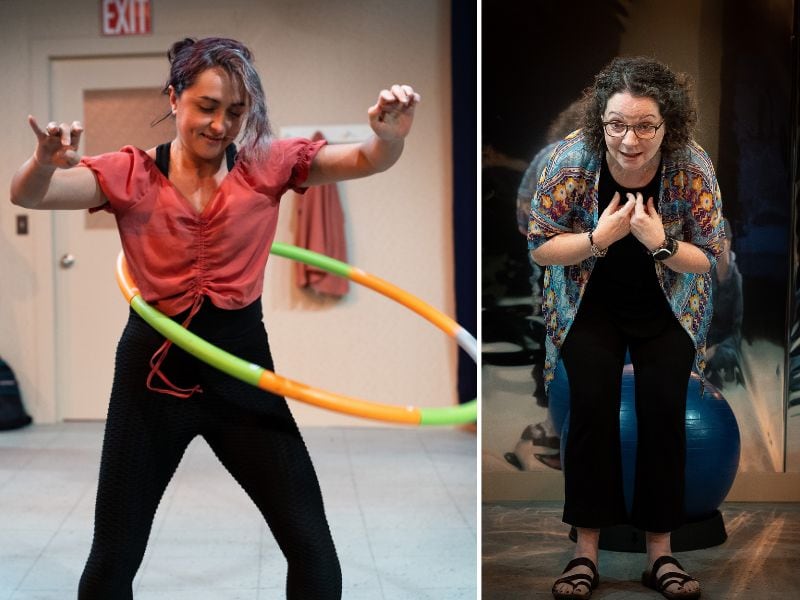The best theater transforms us. Pulitzer Prize and MacArthur awardee playwright Annie Baker knows that instinctively. She’s written a trio of plays about the lives of people in small-town Shirley, Vermont. Circle Mirror Transformation takes us into the “room where it happens” — where theater literally gets made. A nondescript studio in a likely nondescript community center or public school serves as an acting studio for a quartet of students under the tutelage of Marty. She’s their acting teacher for a six-week session consisting of theater games and, ultimately, real life-changing dramas.
For the Silver Spring Stage production, running through October 8, 2022, director Rob Gorman does a terrific job with the five-member ensemble, both Silver Spring Stage stalwarts and a few first-timers with the longstanding community theater company. Marty leads her four students through a series of theater games, exercises, and improvisations. Playwright Baker takes us through a series of episodic scenes punctuated by blackouts.

As Marty, Mara Rosenberg in her company debut plays this teacherly figure with surety, even when the games and exercises she demands of the students make no sense and frustrate. Finally, the one sullenly shy teen, Lauren, demands in exasperation, “Are we going to be doing any real acting?” Visibly miffed, Marty doubles down. There’s the counting game, where the four lie down and as a group attempt to count to ten without two people speaking at the same time. It’s a frustrating and absurd example of theater games that seem to hover between acting exercises and psychotherapy. Other exercises the students are required to perform include one where each is supposed to tell another student’s autobiographical life story as if it is their own.
Over the course of the 105-minute play, what began as theater games becomes far more than just an opportunity to tap into creative self-expression. In Marty’s elliptical exercises, she unknowingly at times leads this disparate quartet toward greater self-awareness and understanding of their place in the world. James, Mary’s husband, is a former California hippie, now teaching economics in a small, local college. In his Vermont-esque hippie wear — tunics and “Free Vermont” T-shirts — David Samuels lends James a scattered, inattentive air as if he’s done all this before. But beneath, he is watchful and self-involved.
Theresa recently relocated to the town of Shirley after a breakup. Apparently, she was a New York actor, and she fully indulges in Marty’s oblique exercises. Dianna Valle relishes Theresa’s comfort with herself, her body, and her gregarious nature. As the initially sullen, uncommunicative teen Lauren, Davis Leonard, with her curtain of brunette hair, retreats into her hoodie. Finally, Shultz, a recently divorced carpenter, attaches himself to Theresa, hoping for an intimate relationship. David Dieudonne incrementally reveals the shading of emotional turmoil beneath the surface of this seemingly simple character.

Set Designer Joy Wyne provides the nondescript classroom with the requisite mirror, benches, and sundry equipment. Jennifer Morrissey’s costumes — from Marty’s loose-fitting Chico’s-style jackets, which suit her middle-aged-mom demeanor, to the men’s basic statement tees and Lauren’s collection of baggy clothes that hide her teen body — are as suitably nondescript and character-specific. Steve Deming’s lights, particularly the ghostly wavy interludes between the short scenes, toggle between reality and a dreamlike otherworld.
Director Rob Gorman has allowed the fine cast to capture and convey the essence of these characters in ways that are both revelatory and meaningful. Circle Mirror Transformation, while a small play with a single scene and small cast, is not inconsequential, and Gorman understands that in these small casual interactions consequential growth can occur, even in the unlikeliest of places. While Marty leads the class using theater games, there is nothing gamelike in the discoveries these cast members make about themselves and their compatriots. This is one way that theater at its best can transform us.
Running Time: One hour 45 minutes with no intermission.
Circle Mirror Transformation runs through October 8, 2022, at Silver Spring Stage — 10145 Colesville Road, Silver Spring, MD. Tickets ($22–$25) can be purchased online.
COVID Safety: Silver Spring Stage requires all audience members and all non-performing volunteers to wear masks. The theater’s complete COVID-19 Protocols are here.
Circle Mirror Transformation by Annie Baker
Directed by Rob Gorman
Co-produced by Bill Hurlbut and Tristan Poje
Cast
Marty – Mara Rosenberg
James – David Samuels
Schultz – David Dieudonne
Theresa – Diana Valle
Lauren – Davis Leonard
Lauren (US) – Ray Sparks
Production Team
Stage Manager – Christine Hurst
Intimacy Director – Helen Aberger
Artistic Liaison – Matt Bannister
Set Designer – Joy Wyne
Master Carpenter – Douglas Becker
Lighting Designer – Steve Deming
Sound Designer – Adam Parker
Properties Designer, Set Dressing – Mary Ghitelman
Costume Designer – Jennifer Morrissey




